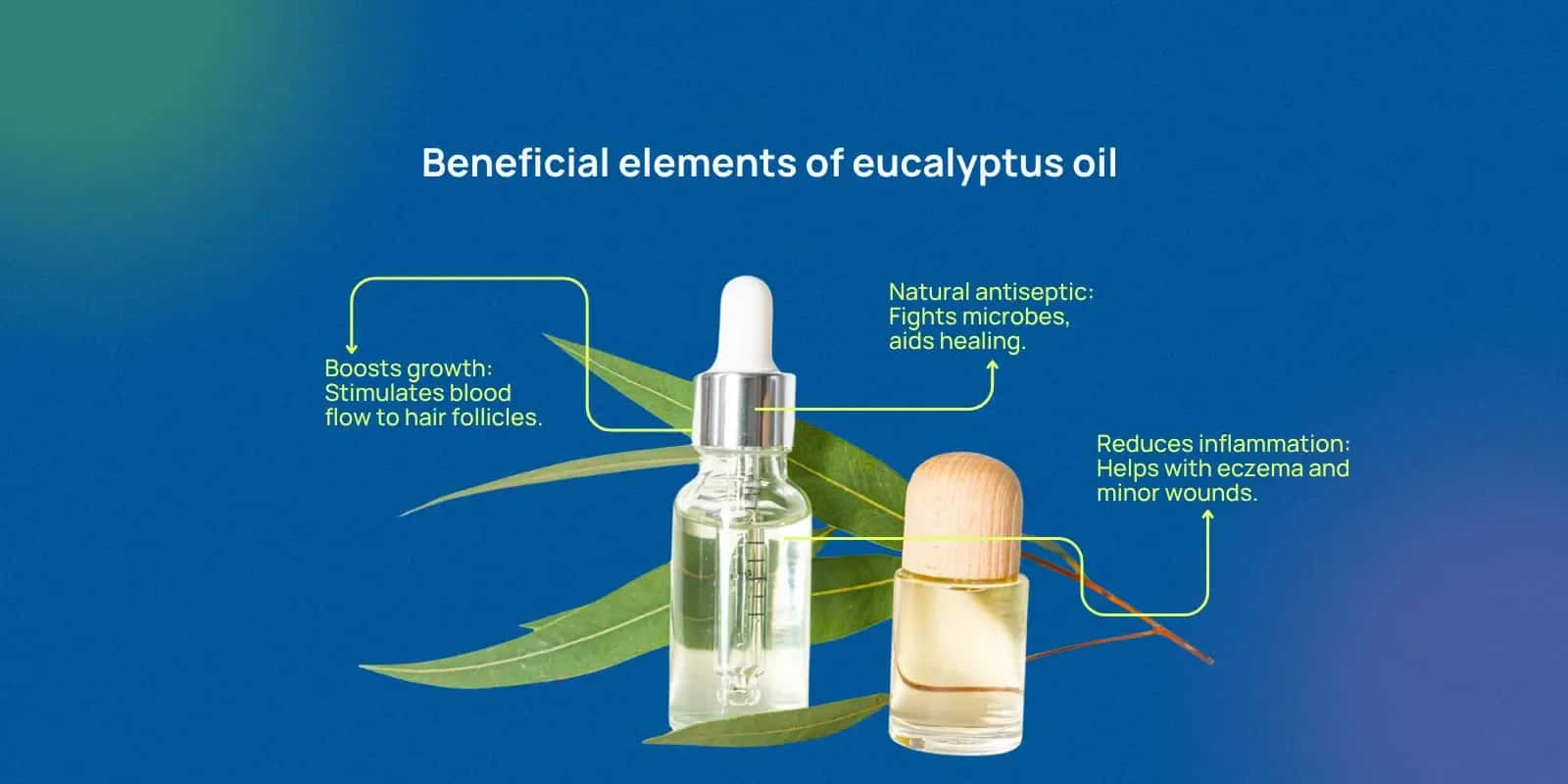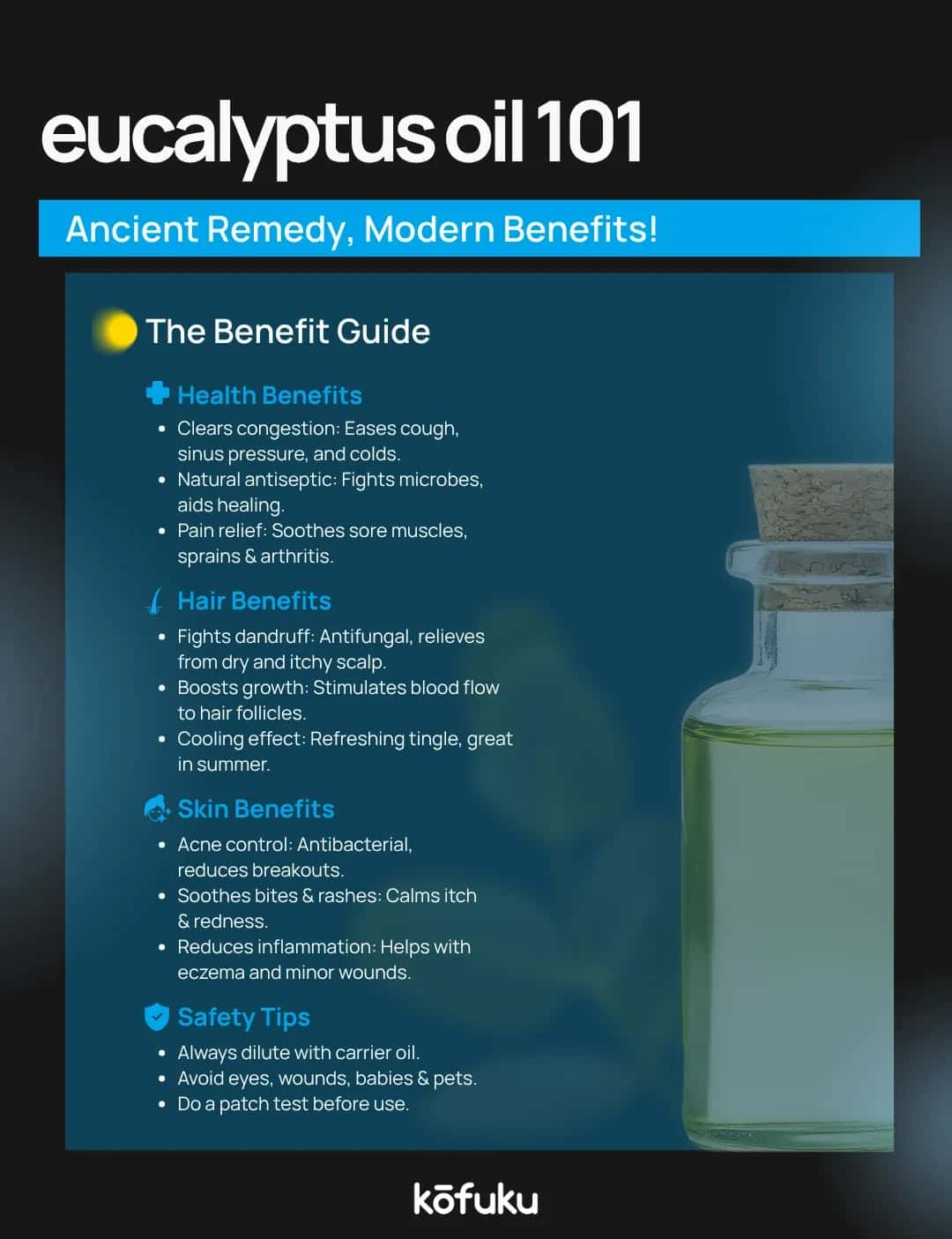Proven Benefits of Eucalyptus (Nilgiri) Oil for Hair, Skin, and Health

Introduction
Struggling with hair issues like dandruff, dry scalp, and hair fall? Well, you are not alone. Many people are struggling with hair issues due to pollution, an imbalanced diet and many other reasons.
One solution to these problems is eucalyptus oil (Nilgiri). Extracted from the eucalyptus tree, this magical potion is making the headlines and all for the right reasons.
Eucalyptus is a fast-growing tree native to Australia, but it is now grown in almost all parts of the world. It is a pale yellow-coloured oil with a characteristic calming odour and should be diluted before use for medicinal purposes.
The nilgiri oil or eucalyptus oil has always enjoyed a proud place in Ayurvedic and aromatherapy practices. This magical oil has a number of health benefits and is extracted from the leaves of eucalyptus.
Eucalyptus oil, along with a carrier like coconut oil, is also beneficial for managing acne. It inhibits the activity of acne-causing bacteria due to its antibacterial properties. It is not only used in beauty products, but also serves a great advantage in the healthcare industry.
In this blog, we will explore how eucalyptus oil can help hair, uses of eucalyptus oil, benefits of eucalyptus oil for skin, eucalyptus oil for cough and more.
What is Eucalyptus Oil?
It is a concentrated essential oil extracted from the steam distillation of eucalyptus leaves. Known for its calming fragrance and natural palliative properties, it features key active compounds, specifically eucalyptol. Because of this, it delivers its signature cooling sensation, antimicrobial properties, and aromatic potency.
Usually called eucalyptus oil or Nilgiri oil in India, it encapsulates both curative and scent aspects of the eucalyptus plant. As such, the essential oil is versatile in everyday wellness practices.
Types of Eucalyptus Oil and Their Uses
Eucalyptus oils can vary based on species and application:
- Eucalyptus globulus oil: Standard essential oil, known for its high eucalyptol content, ideal for respiratory and antimicrobial use.
- Eucalyptus radiata: A milder variant, better suited for children or sensitive skin through safer concentrations.
- Therapeutic grades: Certified eucalyptus oil for inhalation, topical blends, and diffusers.
Each base or diluted form offers slightly distinct benefits, depending on concentration and intended use.

Eucalyptus Oil for Hair Care
If you are wondering if there are benefits of eucalyptus oil for hair, then the answer is yes! Let’s take a look at why eucalyptus oil has emerged as such a people's favourite in the hair and beauty industry.
Benefits of Eucalyptus Oil for Hair
Including eucalyptus hair oil into your hair care routine can support not only hair health but also hair vitality.
- It stimulates scalp circulation, promoting hair growth and fullness.
- Fights dandruff and itchiness due to its antimicrobial properties.
- Encourages clean, balanced scalp condition, ideal for oily or flaky scalps.
- It helps strengthen hair follicles to reduce breakage.
These characteristics make eucalyptus hair oil a great option to include in oils focused on scalp treatments, on its own, or together with coconut or jojoba-based oils.
How to Use Eucalyptus Hair Oil
If you are new to the power of eucalyptus hair oil, here is how to use it:
- Scalp Massage: Warm two to three drops of eucalyptus hair oil with a carrier oil and apply it twice a week. Leave on for 30-60 minutes before shampooing.
- Shampoo Booster: Add three to five drops to your usual shampoo for gentle scalp exfoliation.
- Hair Mask: Eucalyptus hair oil can also be used as a hair mask when mixed with an avocado-olive oil mix for deeper treatment.
- Rinse Weekly: Infuse four to five drops of eucalyptus hair oil in warm water, swish the rinse through your hair after washing to refresh and purify.
Eucalyptus Oil for Skin
Eucalyptus oil is also beneficial for skin care and helps manage acne. Certain compounds present in eucalyptus oil have antibacterial properties. Given below are some of the benefits of eucalyptus oil for skin.
Eucalyptus Oil Skin Benefits Explained
- Antimicrobial and anti-inflammatory: Combats acne-causing bacteria and soothes irritated skin.
- Cooling, refreshing effect: Calms sunburn, itchiness, and minor rashes.
- Skin tone and texture: May help minimise the appearance of mild scars or post-acne marks.
Best Practices: Dilute two to three drops per teaspoon of carrier oil; patch test first. Ideal as a spot treatment or light massage aid, not suited for sensitive facial skin at full strength.
Eucalyptus Oil for Cold and Cough Relief
Studies have shown that eucalyptus oil may be beneficial in treating coughs. Let's explore how eucalyptus oil can aid in relieving coughs and colds.
How to Use Nilgiri Oil for Cold
Eucalyptus excels at supporting respiratory comfort. Here's how to use it effectively:
- Steam Inhalation: Add three to four drops to a bowl of steaming water, inhale for 5–10 minutes to clear congestion.
- Chest Rub: Mix with coconut and apply to your chest and throat area to ease breathing and suppress coughing.
- Diffuser: Add four to six drops to water in a diffuser to purify air and aid respiratory flow.
- Warm Compress: Combine two to three drops in warm water, soak a towel, and place over chest for comfort.
These are the home remedies that are meant to alleviate cough, sinus problems, cold and mild allergic congestion.

Eucalyptus Aromatherapy Oil Benefits
Beyond physical uses, eucalyptus aromatherapy oil engages the mind and senses:
- Boosts mental clarity and alertness
- Uplifts mood with a crisp, forest-like scent
- Supports relaxation and stress relief when inhaled deliberately
- Enhances concentration, ideal for home or office environments
In aromatherapy, pairing eucalyptus with peppermint, lavender, or citrus can create energising, balancing blends tailored to your mood and needs.
Other Surprising Uses of Eucalyptus Oil
Eucalyptus oil also supports our wellbeing in lesser-known ways:
- Natural surface cleaner: Add a few drops to cleaning solutions and benefit from its antimicrobial quality.
- Muscle and joint rub: Cooling agent in oils or balms for after-exercise soreness.
- Odour neutraliser: Add to laundry or closet spray to freshen naturally.
- Insect repellent: Repels mosquitoes and minor pests, used in diffusers or spritz mixes.
Remember, always dilute before applying topically and store in a cool, dark place to maintain potency.
Precautions While Using Eucalyptus Oil
To ensure safe use, keep the following in mind:
- Always dilute: One to three per cent concentration in carrier oil is recommended for skin use.
- Patch test: Check how inner-arm skin reacts before broader application.
- Avoid eye contact or broken skin: It can cause severe irritation.
- Safe for pregnant/nursing women and children: Minimise use, favour milder species (e.g., eucalyptus radiata) and consult a healthcare provider.
- Ingestion warning: Do not consume eucalyptus oil can be toxic.
Final Thoughts
Some research suggests that eucalyptus essential oil may be helpful for treating a cough, clearing mucus from the chest, and making breathing easier in people with respiratory conditions. Eucalyptus oil may also help protect against MRSA, freshen your breath, and ease joint pain.
Larger, human-based studies are necessary to further understand the possible health benefits of eucalyptus oil. Talk with your doctor if you wish to incorporate eucalyptus oil into your treatment plan for an existing condition.
Eucalyptus and eucalyptus essential oil may have antibacterial, anti-inflammatory, and antioxidant properties. It has potential uses as an insect repellent and insecticide, and can help relieve symptoms of coughs and colds.
However, you should consult a doctor before using eucalyptus essential oil, and should never ingest the oil.

FAQs
Q. What are the top five eucalyptus oil benefits for hair?
A. Eucalyptus oil for hair offers multiple benefits, like:
- Promotes hair growth
- Reduces dandruff
- Soothes itchy scalp
- Adds shines
- Strengthens hair follicles
Q. How to use eucalyptus oil for skin problems?
A. Diluted eucalyptus oil with a carrier oil like coconut oil works wonders on the skin, some of these are:
- Reduces inflammation and acne
- Purifies and cleans skin naturally
- Fights bacteria
- Promotes wound healing
- Improves skin texture
- Combats fungal infections
Q. Can eucalyptus oil help with cold and cough relief?
A. Yes, eucalyptus oil helps ease cold and cough symptoms by clearing nasal congestion and loosening mucus. Its vapours have decongestant and anti-inflammatory properties, making it ideal for steam inhalation or chest rubs during respiratory infections like colds, bronchitis, or sinusitis.
Q. What are the uses of eucalyptus aromatherapy oil?
A. As an aromatherapy oil, it helps relieve stress, improve focus, and ease breathing. The refreshing scent clears mental fatigue, while its antibacterial properties purify the air. Because of this, it is often used in diffusers, steam inhalation, and massage blends for a therapeutic, spa-like experience.
Q. Is eucalyptus oil and nilgiri oil the same?
A. Yes, eucalyptus oil and nilgiri oil refer to the same essential oil. "Nilgiri" is the Indian name for eucalyptus, derived from the Nilgiri Hills where it is commonly grown.

10 Effective Ways to Reduce Stress

10 Health Benefits of Apple Cider Vinegar You Should Know

10 Health Benefits of Reflexology You Should Know

10 Health Benefits of Pomegranate

10 Recovery Techniques for Fitness Enthusiasts


